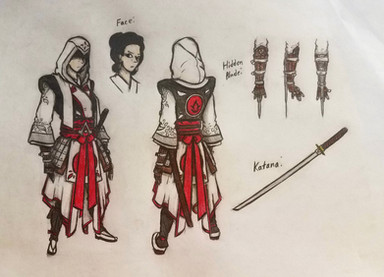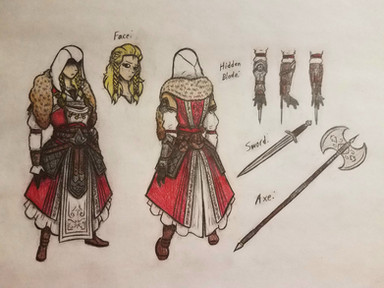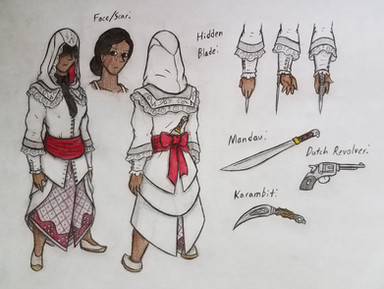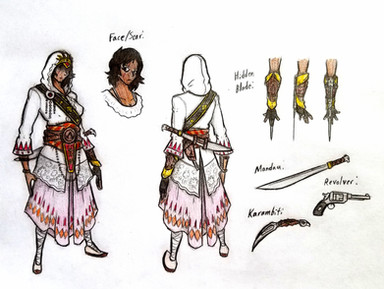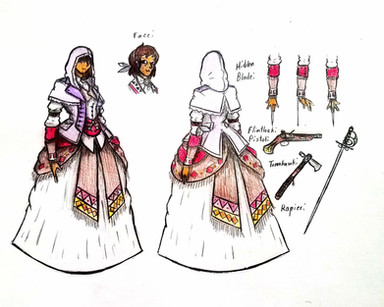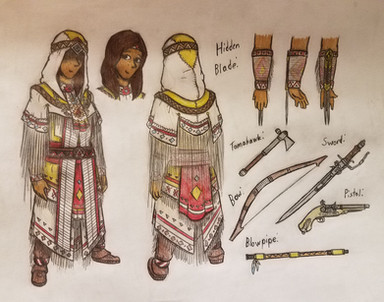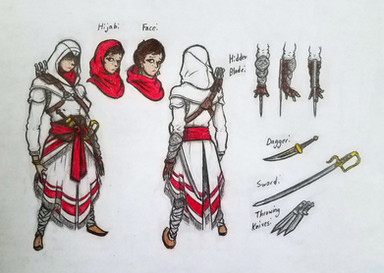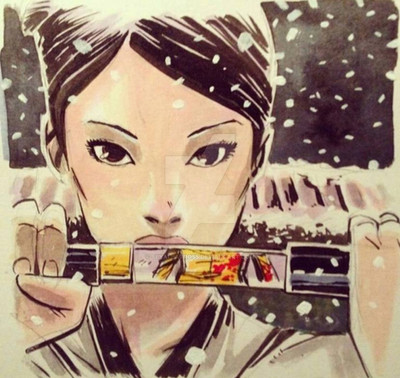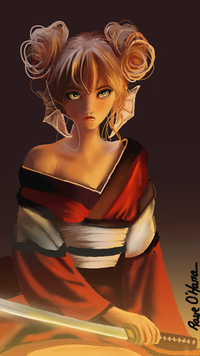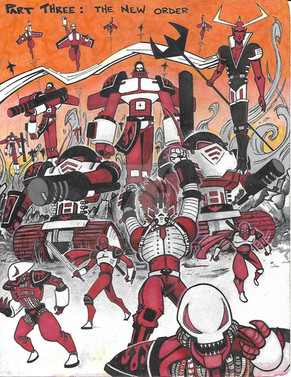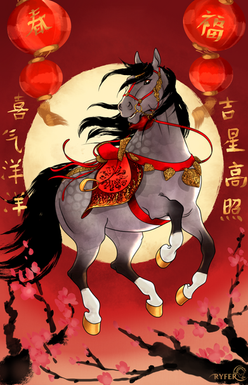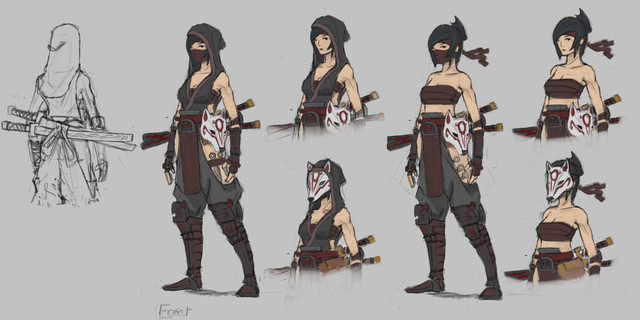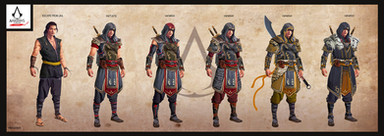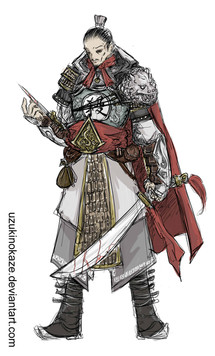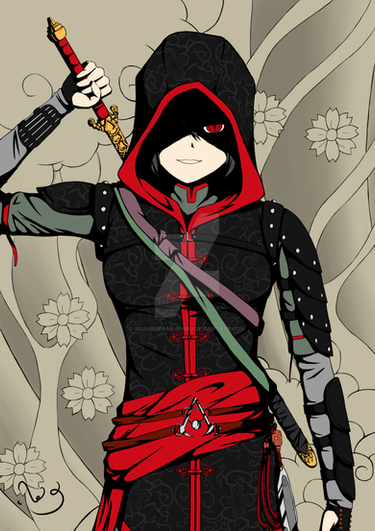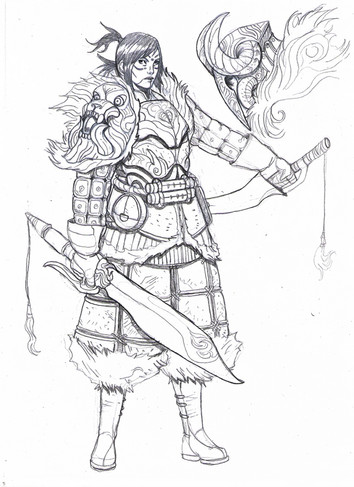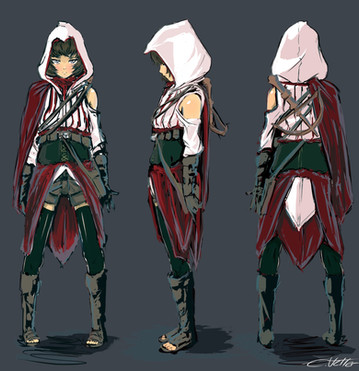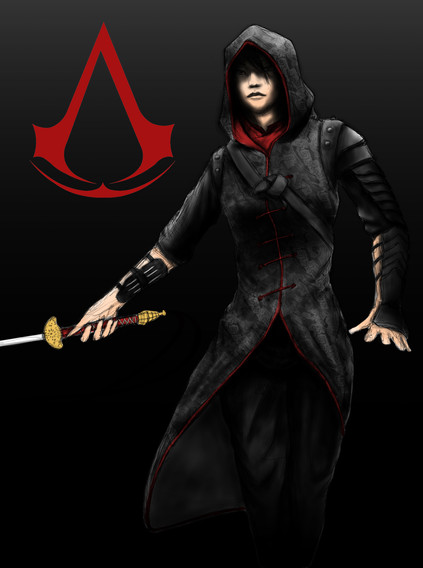HOME | DD
 Avapithecus — Niao Ying
Avapithecus — Niao Ying

#assassin #china #chinese #codex #creed #dynasty #marco #mongols #polo #song #yuan #assassinscreed
Published: 2018-07-27 14:56:22 +0000 UTC; Views: 4435; Favourites: 63; Downloads: 0
Redirect to original
Description
Name: Niăo YingBorn: August 12, 1257; Lin’an, Song Dynasty China
Died: January 23, 1353; Lin’an, Yuan Dynasty China (age 95)
Allegiance: Assassins
Bio: Ying was born in 1257 to a respected and prosperous Song Dynasty warrior who took up arms when she was a little girl to go defend their homeland from the approaching threat of the Mongol horde led by the mighty Kublai Khan. Ying idolized her father, seeing him as an unstoppable hero and a savior to China. On the brief moments he returned home to visit, she soaked in his stories and laughed at the joyous times they shared. But the situation for China itself was looking grim, with the Mongol army tearing through the Song forces battle after battle. One of the last strongholds held by the imperial family was the walled city of Xiangyang, which Ying’s father went to defend when the Mongols began to lay siege in 1567. The battle raged on for 6 years, and Ying heard very little from her father in that time. She worried more and more, especially when the Mongol Khan went so far as to declare his reign a new Dynasty in China: the Yuan. But she kept her hopes up, her faith in her father's strength carrying her through the dark times.
The Battle of Xiangyang ended in March 1273, in Mongol victory. And Ying’s father finally returned home, as a butchered corpse on a stretcher. Ying was mortified by the sight of her father's body, the man she had looked up to her entire life ripped away by barbarians that were now sitting on the Chinese throne. She overheard the soldiers that delivered his body talk about how the incompetence of their commander Jia Sidao was the cause of their defeat, and Ying pinned the blame of her father's death on that man. She wept for days, and when she finally worked up the emotional strength to pick up his gleaming sword that had been recovered from the battlefield, she swore to avenge him.
In 1275, Ying tracked down Jia Sidao, who was in deep trouble with the imperial forces, who went so far as to send a hitman named Zheng Huchen to find and kill him, and planning to try his luck making negotiations with the Mongols. But Ying did not give him the chance. She hunted him down and impaled him on her father's sword. He tried to justify his actions, alluding to Orders and Creeds, but she listened to none of it. She left his body to be found by Huchen, leaving the scene with a few bizarre documents that had fallen out of Jia’s pocket. One was a letter from Jia to the mysterious Order he had mentioned, closed with a wax seal with a cross symbol on it. The other was a parchment of sorts written in Arabic, with what appeared to be blueprints for a wrist mounted blade of sorts. She fled the scene, not giving it much thought, though she did take the blueprints to a blacksmith friend of hers to be built. Her father was avenged, and that was all that mattered to her.
Later that year, Ying found herself selling crops in a small marketplace outside of Shangdu, where Kublai Khan had his imperial palace built. She sneered at the Khan's opulence from afar, always thinking of her father's legacy of fighting to protect China from these invaders. Her mind was taken off of it briefly when a traveller's caravan passed by, men from the far west speaking a strange language. The traveler looked over her goods, but his eyes surprisingly locked onto the page in Arabic she had sitting in the back of her stall. He offered her an enormous sum of money for the page, one which she couldn't really turn down. The traveler thanked her and went on his way, but Ying decided there was something suspicious about the whole situation, and so closed her stall to tail the man. The caravan seemed to be heading towards the palace, but was suddenly stopped by a band of raiders. Ying made a split second decision to take the caravan’s side and fight off the attackers. The man thanked her greatly, now formally introducing himself as Marco Polo, and offered her to follow him on his envoy to meet Kublai Khan. Ying was hesitant, not wanting to be in the Khan's court, but she had many questions, and she assumed following this man would be a good way to get the answers.
Ying followed Polo and his caravan into the court of the Khan, and listened to him grant the Khan gifts from his homeland of Venice before leaving and meeting with his allies in the streets outside. Ying crashed their conversation when she heard him talk about the same Order and Brotherhood that Jia had mentioned in his letters, and demanded to know what was going on. Polo, seeing potential in the girl, began to tell her as much as he could. He explained there was a dark force in China seeking to use the Mongols to dominate the land for their own personal gain: the Templar Order. He also explained that he was a member of the Brotherhood trying to stop them: the Assassins, a group thought to have been wiped out in 1257 when the Mongols laid siege to Masyaf. He told her his father and uncle were present in Masyaf that day, and that they had been given a special Codex by the Mentor, Altaïr Ibn-La’Ahad, but that it was stolen by the Mongols who brought it here to China. Its pages contained valuable secrets, and so Marco and his family ventured to China to get it back from the Templars who now held it. Ying was offered a chance to help out, and after a long night of consideration, she agreed, both to save China and carry on the legacy of her father.
One of her first official missions as an Assassin was in 1279, when she met with the last remaining Song rebels held up at their base in Yamen. She attempted to help make plans with the imperial family, but her chance never came. A Mongol army led by the Templar Zhang Hongfan attacked the town and forced the last of the rebels to cede power to the Khan. Ying barely escaped with her life, and once she returned to the Polos, she immediately made plans to assassinate Zhang, which she managed to do the next year. She recovered a Codex Page from his body, one explaining various new assassination techniques. Ying added a second hidden blade to her arsenal, and planned to investigate the schemes of her next target: a Mongol puppet named Ahmad Fanakati who worked as a financier for the Templars. Ying tracked the source of the funds he used to abuse the lower class citizens of China back to none other than the Khan's wife herself: Empress Chabi. Seeing it as the only way to cut off Fanataki’s funds, she killed the empress in 1281, and then killed Fanakati in 1282. From Fanakati she took another Codex Page, one detailing blueprints of a hidden blade capable of injecting poison into an enemy.
By 1285, the Mongol power structure was finally beginning to waver. Kublai Khan had grown reclusive and prone to anger after the loss of his wife. His advisers recommended abdicating the throne so that his son Zhenjin (secretly a Templar agent) could succeed him without conflict. But the Khan was infuriated, seeing the suggestion as a challenge to his power, and he shrugged them all off. Before the Templars could have a chance to regroup and plan, Ying assassinate the prince in 1286, sending the Templars into disarray. From the prince, Ying recovered another page, one explaining how to craft a hand cannon small enough to be mounted and concealed on her wrist. Needless to say, she rushed to have it built and added to her arsenal. She would use her new weapon to assist the rebellions that were springing up across China, especially the ones led by a disgruntled prince named Nayan in 1287. A Templar general named Aju was sent out to squash these rebellions, but Ying assassinated him before he had a chance. While the rebellions ultimately died out, unsuccessful, by 1289, the Assassins now had a clear upper hand.
The last major name on Ying’s list was a powerful Templar general named Bayan of the Baarin. He had attempted to steal back the completed Codex from her and Marco Polo, but they managed to out maneuver him at every turn. Marco was given permission by the Khan to leave China and return home in 1293, as long as he escorted a Mongol princess to her consort in Persia. Ying followed them the entire way, passing the Codex into his capable hands before saying her goodbyes and returning to her home to fight Bayan once and for all. She stopped by the Khan's palace in 1294, planning to assassinate him. She was surprised by how willing he was to accept his fate, feeling like he had nothing left to live for. And so for the first time in her life, Ying felt a twinge of respect for the Khan before she slid her blade into his heart. She confronted Bayan the following year, and after a long, brutal clash of blades, she emerged the ultimate victor. Bayan was impaled on her father's sword, and the last of Templar influence in China was finally eradicated for the foreseeable future. And Ying knew her father was proud of her.
As the years went on, Ying continued to work with the Assassins to reclaim China from the Mongol leaders of the Yuan Dynasty. In 1324, she had received word from her brothers in Venice that Marco Polo had been killed by the Templars, but that the Codex of Altaïr had been put in the safe hands of his apprentice who had taken up the name of Domenico Auditore. The Templars had hired pirates to attack Auditore’s family and steal the Codex, but Domenico had broken the book up into many pages again, sending them off to be scattered so that the Templars would never get their hands on it and the secrets it contained. Ying herself rose to the rank of Mentor of the Chinese Brotherhood, known to her students as the wise old woman of Lin’an. She did not live to see the fall of the Yuan Dynasty, having passed away in her sleep in 1353, but she did live to see the uprisings that were beginning to rise up across China to overthrow the Mongols. Her descendants would go on to assist these rebellions, and by 1368 they had cast the Yuan Dynasty out for good, putting a new Chinese Emperor on the throne as the founder of the Ming Dynasty, ushering in a new age for the nation.
Ying is an ancestor of Ava Arlie.
Related content
Comments: 15

👍: 1 ⏩: 1

👍: 1 ⏩: 1

👍: 1 ⏩: 0

👍: 0 ⏩: 1

👍: 0 ⏩: 0

They should make a game about her someday.
👍: 0 ⏩: 1

As long as I get the royalties lol
👍: 0 ⏩: 1

Plus the story you wrote for her was awesome, setting up Assassin’s Creed II.
👍: 0 ⏩: 0

I love this Assassin attire! I wish this character was going to be in a future game
👍: 0 ⏩: 1

Woah! The whiteness! New scanner? Looks great!
👍: 0 ⏩: 1

Been experimenting with new editing stuff XD
👍: 0 ⏩: 0
